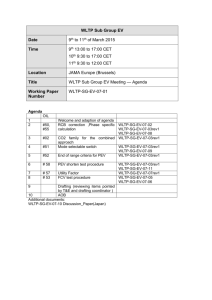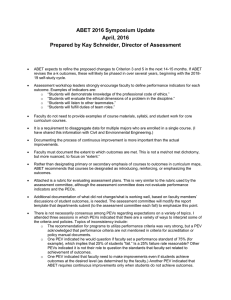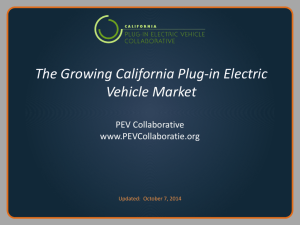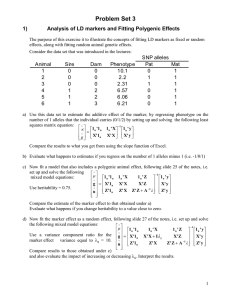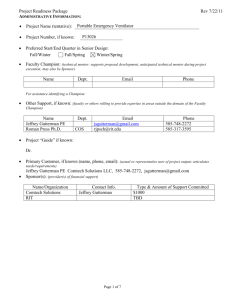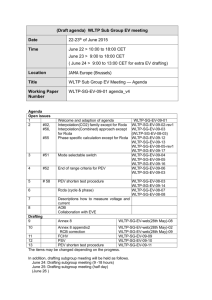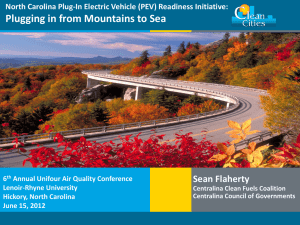NC PEV Taskforce`s “News
advertisement
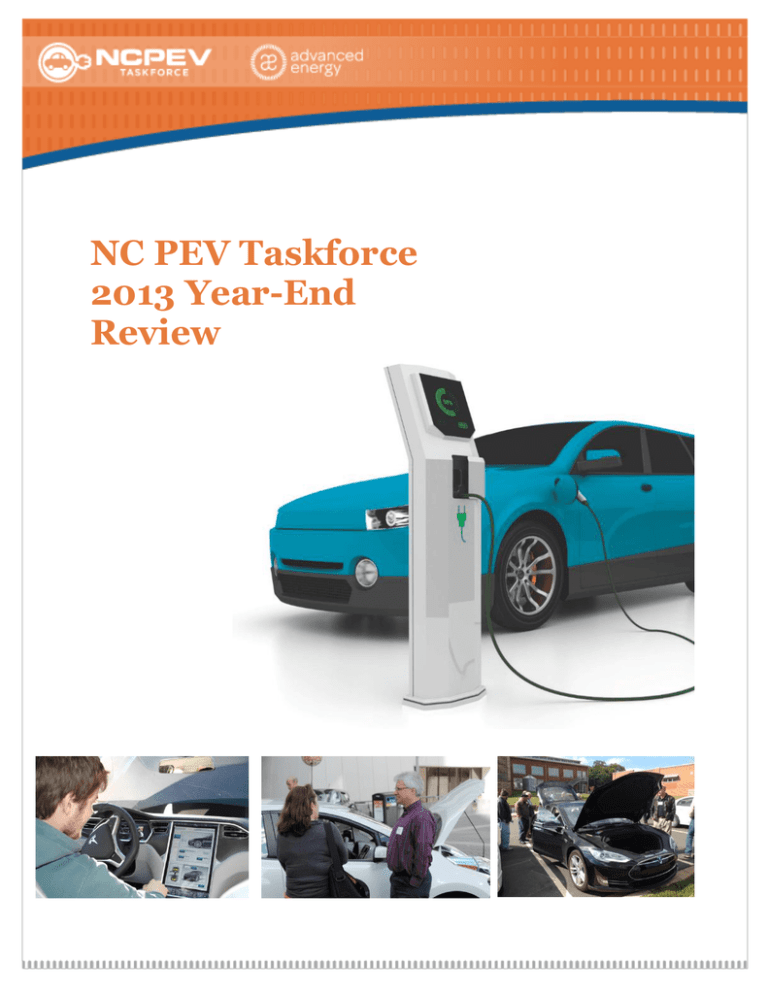
NC PEV Taskforce 2013 Year-End Review Contents NC PEV Taskforce Steering Committee Members and Partners ............................. 3 Overview of Plug-in Electric Vehicles in North Carolina ......................................... 4 NC PEV Taskforce Organization Chart ........................................................................................7 Goals of the North Carolina PEV Taskforce (Updated 2013) ......................................................7 North Carolina PEV Roadmap (North Carolina PEV Readiness Initiative: Plugging-in from Mountains to Sea) ........................................................................................................................7 2013 Taskforce Accomplishments ......................................................................................... 8 1. North Carolina PEV Taskforce Goal Update (January 2013) .................................................. 8 2. Taskforce Website Improvements (January, 2013) ................................................................ 9 3. NC PEV Roadmap Release (February 2013) ..........................................................................10 4. NC PEV Taskforce Spring Summit (March, 2013) .................................................................10 5. NC PEV Taskforce Webinar Series (April-December 2013) .................................................. 11 6. Working Groups (March-December 2013) ............................................................................ 11 8. Workplace Charging (2013) ................................................................................................... 13 Looking Forward: 2014 ........................................................................................................... 16 NC PEV Taskforce Partner Updates: 2013 .......................................................................... 17 For additional information about the NC PEV Taskforce Contact: Katie Drye or Tyler Bray at transportation@advancedenergy.org, or call 919-857-9000 2 NC PEV Taskforce Steering Committee Members and Partners 3 Overview of Plug-in Electric Vehicles in North Carolina The North Carolina Plug-In Electric Vehicle (NC PEV) Taskforce is committed to see our state prepare for the successful integration of PEVs and take advantage of the many benefits they offer including economic development, environmental, reduced operating costs and diversification of fueling sources. With a highly interested and educated public, North Carolina is a prime location for electric vehicles. The high-tech, academic and business focus of the metropolitan regions of Asheville, Charlotte, Greensboro- Winston-Salem and Raleigh-Durham have made these regions prime locations for PEV adoption. Additionally, the mountains and coast bordering each end of the state, present opportunities for sustainable tourism and preserving these beautiful and scenic spaces. Since the launch of PEVs in North Carolina in 2011, sales have steadily risen, with over 700 PEVs registered to drivers in the first year (August 2012). August 2013 data from the North Carolina DMV reveals there are now over 1,600 registered vehicles in the state with at least one PEV registered in 85 of the state’s 100 counties, representing a 133% increase from the first year of sales 1. 0F The increase in PEV sales is likely to continue as interest from the general public rises and readiness efforts are implemented. When electric vehicles were first on the market in 2011, there were only a limited number of models available for sale (primarily the Nissan LEAF and Chevy Volt) and they were only available in certain parts of the state with very little charging infrastructure to support their drivers. As of 2013, the number of available models has increased to seven with the addition of models from Ford, Mitsubishi and Tesla, among others. Public charging station installations and are increasing at North Carolina locations include shopping centers, workplaces, hospitals, tourism/entertainment venues, and public parking lots, etc. 1 Data obtained by Triangle J Council of Governments/Triangle Clean Cities Coalition from the NC DMV. August 2013. 4 Map Prepared by Centralina Council of Governments/Centralina Clean Fuels Coalition in association with the Land-of-Sky Regional Council/Land-of-Sky Clean Vehicles Coalition and Triangle J Council of Governments/Triangle Clean Cities Coalition The increase in PEV adoption has not gone unnoticed and North Carolina is receiving investment through the installation of additional charging infrastructure. Most notably, in 2013 and 2014, is the deployment of 35 DC Fast Charger stations throughout the state through various projects and partners in North Carolina. The significance of these projects in our state is great, considering at the beginning of 2013, there were no publicly accessible DC fast charge stations in the state. Notable deployments include: Tesla Motors- Opened two Supercharger locations in Burlington and Rocky Mount and have plans to install at several other locations throughout the state. Advanced Energy and Brightfield Transportation Solutions (partnering with Nissan)- Began host site selection for 30 DC Fast Charge locations throughout the state. 5 Brightfield Transportation Solutions Photo Source: Brightfieldts.com Tesla Supercharger Station in Rocky Mount Photo Source: Teslamotors.com NC PEV Taskforce: Background The NC PEV Taskforce was launched in 2011 through a collaboration of many partners ranging from government, industry, electric utilities, non-profits, and other stakeholders. Advanced Energy and the NC Department of Commerce served as the lead entities for this initiative and benefited from strong partnerships from North Carolina’s electric utilities including Duke Energy, North Carolina’s Electric Cooperatives, Dominion Power, and the State’s ElectriCities, state, regional and local government entities including North Carolina’s three Clean Cities Coalitions, industry and academia. In the fall of 2011, the NC PEV Taskforce received an infusion of resources from the U.S. Department of Energy’s Clean Cities Program to create the state’s first PEV readiness plan called the NC PEV Roadmap. 6 NC PEV Taskforce Organization Chart Webinars NC PEV Taskforce (Led by Advanced Energy) Steering Committee Working Groups Resources Goals of the North Carolina PEV Taskforce (Updated 2013) Continue to identify and address barriers to PEV adoption. Increase economic development opportunities through involving and recruiting industry partners. Prepare and actively search for funding opportunities for PEV readiness and North Carolina PEV Roadmap implementation. Establish implementation framework for North Carolina PEV Roadmap to allow for implementation through North Carolina stakeholders. Collaborate and coordinate with other states on their PEV readiness activities. Distribute the North Carolina PEV Roadmap to stakeholders across the state. (Roadmap intended to be publicly accessible and replicable.) North Carolina PEV Roadmap (North Carolina PEV Readiness Initiative: Plugging-in from Mountains to Sea) In the fall of 2011, partners of the North Carolina PEV Taskforce received a grant from the U.S. Department of Energy’s Clean Cities program to create the state’s first PEV Readiness Plans. Project partners included North Carolina’s three clean cities coalitions, Advanced Energy and the NC Solar Center. North Carolina’s PEV readiness plan (NC PEV Roadmap) was accompanied by four regional plans in the greater Asheville, Charlotte, Greensboro- Winston-Salem, and Raleigh- Durham areas (all plans were released in February, 2013 and posted to www.NCPEVTaskforce.org). The NC PEV Roadmap (State-wide Readiness Plan) 7 The NC PEV Roadmap included an overview of PEV readiness in our state and provided recommendations for implementation on the following topic areas (all of which were guided by individual stakeholder working groups): - Vehicles - Infrastructure - Education and Outreach - Policies, Codes and Standards - Incentives and Economic Development Since the release of the NC PEV Roadmap in February, 2013, the North Carolina PEV Taskforce has focused on educating stakeholders and implementation of the plan. 2013 Taskforce Accomplishments The NC PEV Roadmap recommends strategic steps for implementation of PEV readiness in North Carolina, and North Carolina PEV Taskforce partners are working towards this goal through addressing key high-priority actions. The purpose of this Year-end Review is to provide an overview of the North Carolina PEV Taskforce and partner efforts for electric vehicle implementation. Below is a list of activities completed by the North Carolina PEV Taskforce for 2013. 1. North Carolina PEV Taskforce Goal Update (January 2013) Members of the Steering Committee reviewed and updated the original goals of the North Carolina PEV Taskforce (many of which had been accomplished within the first year). Original Goals (Established 2011) Identify and address barriers to PEV Adoption in North Carolina (initial barriers identified and documented for NC PEV Roadmap). Involve existing and potential industry partners to increase economic development opportunities (industry partners identified). Recruit new industry to North Carolina. Create a state-wide PEV Roadmap for North Carolina (completed). Prepare North Carolina to take advantage of future funding opportunities related to PEVs. Updated Goals (2013) Continue to identify and address barriers to PEV adoption. 8 Increase economic development opportunities through involving and recruiting industry partners. Prepare and actively search for funding opportunities for PEV readiness and North Carolina PEV Roadmap implementation. Establish implementation framework for North Carolina PEV Roadmap to allow for implementation through North Carolina stakeholders. Collaborate and coordinate with other states on their PEV readiness activities. Distribute the North Carolina PEV Roadmap to stakeholders across the state. (Roadmap intended to be publicly accessible and replicable.) 2. Taskforce Website Improvements (January, 2013) The North Carolina PEV Taskforce website was updated with two new informational pages for “Resources” and “News and Events”. The purpose of these pages was to create a forum to share resources from the NC PEV Roadmap and news from PEV implementation efforts. Resources Page News/Events Page 9 3. NC PEV Roadmap Release (February 2013) The NC PEV Roadmap, along with the four regional plans, (created through the NC PEV Readiness Initiative: Plugging-in from Mountains to Sea), were released in February 2013, and posted to the North Carolina PEV Taskforce website. (Plans can be downloaded at www.NCPEVTaskforce.org). 4. NC PEV Taskforce Spring Summit (March, 2013) North Carolina celebrated the release of the NC PEV Roadmap with a statewide gathering in Raleigh, on March 13, 2013. This event featured keynote speaker Joe Dooley, Senior Associate with the Pew Charitable Trust’s Clean Energy Program, and provided an overview of the NC PEV Roadmap and four regional readiness NC PEV Taskforce Working Group Champions plans. Other notable activities at the Spring Summit included an awards luncheon for outstanding contributors to the Taskforce, an implementation panel focusing on the next steps in PEV readiness, and a vehicle ride and drive which showcased many models of electric vehicles. Summit Ride and Drive on Fayetteville Street in Downtown Raleigh NC PEV Taskforce Spring Summit’s opening remarks being delivered by Ward Lenz, Director of the North Carolina State Energy Office 10 5. NC PEV Taskforce Webinar Series (April-December 2013) Starting in April 2013, the NC PEV Taskforce launched a webinar series, the intent of which was to educate stakeholders in North Carolina about resources and topic areas of the NC PEV Roadmap and to continue to address key priority areas for PEV implementation. The NC PEV Taskforce Steering Committee guided the selection of webinar topics by noting high-priority items from the NC PEV Roadmap and through administering a survey to taskforce members. Video and presentations from the NC PEV Taskforce 2013 Webinar Series can be viewed at the NC PEV Taskforce’s “News/Events” page (www.NCPEVTaskforce.org). 2013 Webinar Series Topic Date Speakers Registrants PEVs and the April 30 Mike Kleeman, UC Davis 115 Environment Katie Shepherd, NC GreenPower Elaine Loyack, Triangle Air Awareness Workplace July 16 Charging Sarah Olexsak, US Department of Energy 202 Lisa Shpritz, Bank of America Lisa Poger, Advanced Energy Increasing October Stan Cross, Brightfield Transportation Solutions Range 16 Tommy Buzzell, Ritz-Carlton, Charlotte Confidence Lisa Poger, Advanced Energy Policy, Codes December Laurel Wright, NC Department of Insurance and Standards 17 Mark Rabinsky, Clean Energy Coalition (ADA and Zoning) 112 122 Cyrus Dastur, Advanced Energy 6. Working Groups (March-December 2013) Infrastructure Working Group (DC Fast Charger Planning) The NC PEV Taskforce restarted the Infrastructure Working Group in May 2013 to specifically focus on DC fast charge deployment in North Carolina. The goal of this working group was to create an amendment to the NC PEV Roadmap covering the following considerations for DC fast chargers: Host site selection criteria Equipment needs and specifications Ownership and operating models 11 Strategic deployment and geographical planning Promoting DC fast charging in North Carolina The Roadmap amendment is a series of best practices and recommendations for DC Fast Charger deployments for the state of North Carolina. Starting in 2013, four DC Fast Charger deployment initiatives were launched by various entities targeting the state of North Carolina (the list is included in the table below). 2013/2014 DC Fast Charge Deployment Initiatives in North Carolina Program Target Areas Advanced Energy Greater Triangle and Charlotte Metro Regions Brightfield Transportation Statewide (North Carolina) Solutions Nissan Nissan Dealerships and Corporate Centers Tesla Major Highway Corridors and City-to-City Connections Visit individual program websites for information on individual implementation efforts The Roadmap amendment on DC Fast Charger considerations (Chapter 4 of NC PEV Roadmap) will be released in February, 2014. Please check back to www.NCPEVTaskforce.org for updates and more information. Smart Transportation Working Group In 2013, The NC PEV Taskforce partnered with the Research Triangle Regional Clean Tech Cluster to create a Smart Transportation Industry Engagement Group. This working group built on the momentum created by the 2012 NC PEV Taskforce working group on Economic Development and Incentives (led by the NC Department of Commerce and the NC Solar Center). The industry engagement group is led by Advanced Energy and involves industries working in various emerging transportation initiatives in North Carolina. 12 7. NC PEV Taskforce Fall Implementation Summit (October 2013) The NC PEV Taskforce marked eight months from the release of the NC PEV Roadmap with the Fall Implementation Summit in Conover, North Carolina on October 24. This Summit focused on implementation of the NC PEV Roadmap through featuring various PEV implementation efforts in North Carolina including representatives from DC Fast Charger deployment initiatives for Nissan North America, Tesla Motors, Brightfield Transportation, and Advanced Energy. North Carolina’s three Clean Cities Coalitions provided updates on their PEV implementation efforts in the Asheville, Charlotte and Triangle regions. Summit attendees participated in breakout sessions focusing on next steps in PEV readiness and were able to participate in vehicle ride and drives following the event. Daniel Witt, Tesla Motors (left) and Cornelius Willingham, Nissan North America (right) Vehicle Display and Ride and Drive 8. Workplace Charging (2013) In North Carolina, the NC PEV Taskforce is encouraging employers to learn more about workplace charging through the promotion of the U.S. Department of Energy’s Workplace Charging Challenge and providing educational resources and tools. In 2013, seven companies in North Carolina pledged to become Workplace Charging Challenge Partners and Advanced Energy, who leads the NC PEV Taskforce, was designated as a Workplace Charging Ambassador and is tasked as a stakeholder organization to promote and support workplace charging. Many more companies in addition to the seven Workplace Charging Partners have installed or are considering installing charging stations. 13 Screen Shot from Webpage on US DOE Workplace Charging Challenge Partners In July, 2013, the NC PEV Taskforce hosted a webinar on workplace charging. Speakers included representatives from the U.S. Department of Energy, Advanced Energy and Bank of America. The representative from the U.S. Department of Energy shared information and resources through the Workplace Charging Challenge. Advanced Energy reviewed three case studies from workplace charging installations in the Raleigh-Durham area and lastly, Bank of America, whose corporate headquarters is in Charlotte, reviewed their experiences and lessons learned with installing workplace charging at their offices in downtown Charlotte. Finishing up the year, in December 2013, the NC PEV Taskforce hosted a Workplace Charging Workshop to educate and encourage North Carolina employers and employees about workplace charging considerations. The workshop was organized by Advanced Energy as part of the Alternative Fuels Implementation Team (AFIT for North Carolina - a collaboration of the NC Solar Center, North Carolina's three Clean Cities Coalitions and additional partners, supported in part with funding from the US Department of Energy Clean Cities Program). Additional sponsors and partners also included Wake County Economic Development, the Regional Transportation Alliance, Research Triangle Clean Tech Cluster, Triangle J Council of Governments/Triangle Clean Cities Coalition. 14 Workplace Charging Workshop Date and Location Speakers Notes Dec 11th: Chuck Alley, Qualcomm NC State’s Centennial Campus Raleigh, NC State Carmalee Scarpitti, currently has ten (10) charging City of Raleigh stations available to faculty, Centennial Campus at Advanced Blake Johnson, Cisco employees, students and Centennial Energy’s Office Tom Hillard, GSK Campus partner companies. Lisa Poger, Advanced Energy Speakers at the event shared their experiences as employees and PEV drivers with workplace charging. Panelists at the workplace charging workshop speak on their experiences with workplace charging Participants at the workplace charging workshop view electric vehicle models at the vehicle ride and drive NC PEV Taskforce Partners at the workplace charging workshop. From Left to Right: Marcy Bauer, North Carolina Solar Center, Jane Brasier, Advanced Energy, Mike Waters, Duke Energy, Lisa Poger, Advanced Energy 15 Looking Forward: 2014 The NC PEV Taskforce is excited about the notable accomplishments and progress made towards PEV readiness in 2013. Next year will continue the progress and NC PEV Taskforce partners are looking ahead to keeping the momentum high in 2014. Some of the proposed NC PEV Taskforce activities will include: Launching at least one topic specific working group to work through relevant issues for PEV readiness. Topic will be identified NC PEV Taskforce participants and may include items such as signage, policies, economic development, etc. Hosting one statewide NC PEV Taskforce Summit. Continuing with stakeholder education and engagement through a regular webinar series and launching a stakeholder newsletter. Continuing to implement key recommendations of the NC PEV Roadmap. Updating the NC PEV Taskforce website on a regular basis to provide information and resources to stakeholders in North Carolina. Promoting the work of the NC PEV Taskforce to local, regional and statewide and national media outlets. Continuing to recruit and add new members. 16 NC PEV Taskforce Partner Updates: 2013 The Taskforce is a voluntary stakeholder organization and benefits from having many champions of PEV of readiness in the state. Among these include the state’s three clean cities coalitions (Triangle Clean Cities Coalition, Centralina Clean Fuels Coalition, and the Land-ofSky Clean Vehicles Coalition), cities, electric utilities, non-profits and universities just to name a few. The work of the NC PEV Taskforce is just a portion of many PEV readiness efforts in NC. This section highlights just a few of the Taskforce Partners and their work in PEV readiness in North Carolina. Advanced Energy Advanced Energy is a non-profit organization based in Raleigh, NC. The Advanced Energy Transportation Team works with stakeholders to understand, plan for and implement emerging transportation solutions in North Carolina through the State’s Public Benefits Program. Advanced Energy served as the technical lead for the NC PEV Readiness Initiative: Plugging-in from Mountains to Sea funded through the U.S. Department of Energy’s Clean Cities Program. 2013 Activities: Completed and released the NC PEV Readiness Plans through the Mountains to Sea project. Served as lead facilitator for the state-wide plan (NC PEV Roadmap) and coauthor of the Greater Triangle PEV Readiness Plan. Continued to lead the NC PEV Taskforce Coordinated various PEV Workshops and Trainings: o First Responder Training Series o Community Planning Forums Coordinated and led a DC Fast Charge Deployment program for North Carolina to install over 12 DC fast charge stations in the Greater Charlotte and Raleigh-Durham Regions. Presented at various conferences, educational forums, professional associations, etc., some of which include the American Planning Association’s annual Conference, the NC Association of Metropolitan Planning Organization’s conference, and Brunswick Community College’s Annual Sustainability Day. 2014 Activities: Advanced Energy plans to continue to work within NC for PEV readiness through continuing readiness efforts such as the NC PEV Taskforce, and focusing on content specific projects such as workplace charging, multi-family dwellings, “PEV ready homes”, DC Fast Charge Deployment, and other high priority items. 17 North Carolina’s Clean Cities Coalitions Centralina Council of Governments/Centralina Clean Fuels Coalition Centralina Clean Fuels Coalition is housed in Centralina Council of Governments serving the Greater Charlotte area. Centralina served as the project lead for NC PEV Readiness Initiative: Plugging-in from Mountains to Sea, funded through the US Department of Energy’s Clean Cities Program. Locally, they lead the Regional Electric Vehicle Advisory Committee (REVAC) which worked on the Greater Charlotte PEV Readiness Plan and will reconvene in 2014 to guide implementation. 2014 Activities: Reconvene REVAC in 2014 Revisit Greater Charlotte PEV Readiness Plan Continue to Support Infrastructure Deployment Utilize DOE PEV Scorecard to understand needs of municipalities Host trainings for local planners based on PEV Scorecard results Promote DOE Workplace Charging Challenge Continue Education & Outreach Initiatives Formalize Expedited Permitting Process Bring EV Challenge to local high school(s) in partnership with Discovery Place Support and promote installation of DCFC’s in April 2014 Land-of-Sky Regional Council/Land-of-Sky Clean Vehicles Coalition The Land-of-Sky Clean Vehicles Coalition is housed in the Land-of-Sky Regional Council and is one of three US DOE designated Clean Cities Coalitions in NC. The Coalition is leading the effort to get the Asheville Metropolitan Area ready for Plug-In Electric Vehicles. 2013 Activities: Worked with the Asheville Area EV Committee to prepare the Asheville Area PEV Plan released in February 2013 Served on the NC PEV Task Force Steering Committee to implement activities statewide Co-sponsored several First Responder Trainings in the region Assisted Brightfields Transportation Solutions with the DC Fast Charging Initiative Continued education and outreach activities regarding PEVs 18 Assisted Great Smoky Mountains National Park in securing US DOE Clean Cities Program funding for EV Chargers at Visitor Centers 2014 Activities: Assist Brightfields TS with DC Fast Charging Project Continue to represent Asheville region on NC PEV Task Force Assist Smokies Park and others with EVSE projects including funding Promote Workplace Charging in the Region Continue Education and Outreach Activities Encourage additional Wayfinding Signage across region Triangle J Council of Governments/Triangle Clean Cities Coalition Triangle Clean Cities Coalition is housed at the Triangle J Council of Governments and is comprised of public and private organizations that are dedicated to accelerating the use of alternative fuels and advanced transportation technologies to improve air quality and energy security in the greater Triangle Region of North Carolina. Triangle Clean Cities Coalition co-authored the 2012 Greater Triangle PEV Readiness Plan and the 2012 NC Statewide PEV Roadmap, and continue to support the emerging EV market in the Triangle. 2013 Activities: Requested and Analyzed PEV Registration numbers from NCDMV: o The 7-county Triangle region saw an increase from 291 registered PEVs to 708 (243%) in one year. Trends were similar statewide and mirrored national trends in the EV market. o Distributed info to former NC PEV Readiness Initiative: Plugging-in from Mountains to Sea partners. NC EV Fast Charge rollout o Hosted Brightfield TS for a regional DCFC interest meeting on Monday 10-21-13 o Provided support before and after that meeting to connect Brightfield to public officials who might be interested in a free fast charger. EV Co-Marketing Project with NC GreenPower o Collaborated with NC GreenPower to draft marketing materials for a comarketing campaign to join clean renewable energy to EV sales. o Triangle Clean Cities and NCGP met with Advanced Energy and a few dealership partners on July 18th to collect some initial thoughts and reactions to the program. We got some valuable feedback to guide us in creating a webpage and 19 marketing materials for dealers to use to help them make a sale to those potential buyers still skeptical about the environmental benefit of EVs. Carolina Blue Skies Initiative o Administer grant to install and operate 52 EVSE chargers with Durham County, Biogen Idec in Research Triangle Park, Pentair Pool and Spa in Sanford, Orange County, and NC State University. NC PEV Readiness Plan Presentations o Presented the Triangle and Statewide PEV readiness plans to elected officials and transportation planners at meetings of the national American Planning Association conference, the NC Association of Metropolitan Planning Organizations conference, the NC Association of Regional Councils, the Triangle Area Rural Planning Organization and the TJCOG Board of Delegates. 2014 Activities: PEV Registration numbers from NCDMV: Request updated registration information in the summer of 2014 to track progress of the NC EV market. NC EV Fast Charge rollout: Continue to support Brightfield TS and Advanced Energy in implementing the contracting and installation of Fast Charge EVSE infrastructure throughout the Triangle and NC. EV Co-Marketing Project with NC GreenPower: Collaborate with NC GreenPower to finalize marketing materials and a website to facilitate the use of renewable energy made in NC to power NC electric vehicles. Explore expansion of NCGP co-marketing across the state and along related avenues such as EV charging. Carolina Blue Skies Initiative- Continue supporting the operation of 111 EVSE installed through this grant across NC and SC and track their usage for reporting to US Dept of Energy. Electric Utilities The State of North Carolina benefits from having active and engaged public utilities including Duke Energy, North Carolina Electric Cooperatives (NCEMCS), Dominion Power, and ElectriCities. Each of these utilities is engaged in the NC PEV Taskforce as partners and has completed PEV readiness activities in their service territories. For more information from each utility visit their websites. 20 North Carolina Solar Center/North Carolina State University The North Carolina Solar Center’s Clean Transportation program (NC State University) aims to reduce petroleum use by North Carolina fleets through education, outreach and deployment of alternative fuels and advanced vehicle technologies – including PEVs. 2013 PEV Activities: Participation on the PEV Task Force Lead organization for the Alternative Fuel Implementation Team (AFIT) project, which will produce a Toolkit that will include a chapter on PEVs. Project partners will also complete workplace charging workshops as a ‘barrier reduction activity’. This project is funded by the Department of Energy’s Clean Cities program. Emission reduction technology subawards through the Clean Fuel Advanced Technology (CFAT) project are eligible to be used towards the purchase of electric vehicle charging stations. The first round of funding for the 2013-2015 project cycle provides support for 21 EVSEs in diverse locations including a corporate campus and public parking in greater Triangle, Triad and Charlotte regions. CFAT is sponsored in part by the North Carolina Department of Transportation. Another call for projects anticipated for early 2014 will include support for PEVs in addition to EVSE. 2014 PEV Activities: At least one additional round of CFAT funds will be made available in 2014, and again PEV and EVSE purchases will be included as eligible technologies. The Alternative Fuels Toolkit, referenced above, will be completed in May 2014, after which it will be made available to AFIT partners to conduct fleet consultations, and made public for fleets to use on their own if they don’t need consultation. Host/facilitate the Southeast Alternative Fuels Conference, October 22-24 2014, which will include tracks and panelists involved in PEV readiness and utilization. 21 Research Triangle Cleantech Cluster (RTCC) The Research Triangle Cleantech Cluster is an initiative of business, government, academic and nonprofit leaders working to accelerate the region’s cleantech economy through collaboration and partnerships that promote innovation and sector growth. The Research Triangle Regional Partnership (RTRP) formed and manages the RTCC with funding from industry board members ABB Inc., Cisco Systems, Duke Energy, Field2Base Inc., Itron Inc., Power Analytics Corp., PowerSecure International, RTI International, SAS, Schneider Electric, Sensus and Siemens and its members. RTRP is the public-private partnership that leads economic development strategy for the area within a 60-mile radius of the Raleigh-Durham International Airport and the Research Triangle Park in North Carolina. RTCC launched in 2012 with a focus on smart grid. The expanded focus on smart transportation holds exceptional potential for innovation and business development in the region. RTCC’s industry engagement work group has sought to be a convener and collaborator, by introduce companies to one another and technologies to consumers. For more information, visit www.researchtrianglecleantech.org. 2013 PEV Activities: In March 2013, the Research Triangle Cleantech Cluster (RTCC) launched its smart transportation industry engagement group to capitalize on the region’s critical mass of PEV companies and research. RTCC welcomed a partnership with Advanced Energy to extend the reach of the North Carolina PEV Taskforce and the more than 200 organizations in the state’s electric vehicle supply chain. 22
